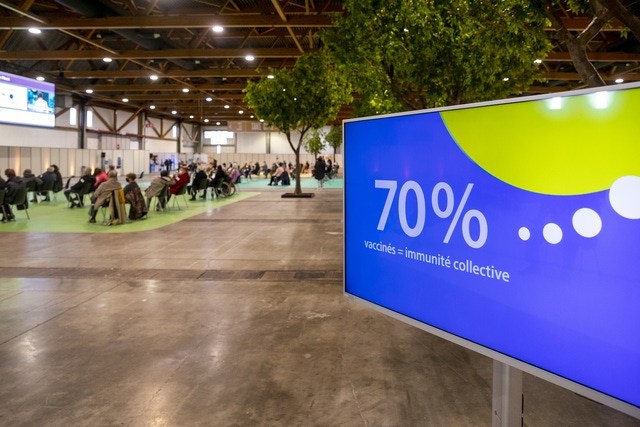On the surface, Belgium's vaccination campaign seems to be running successfully, however, things get a bit more complicated once you begin to break the numbers down, as a regional divide is showing significant gaps in the country's vaccine race.
Despite Belgium briefly being named the fastest country in the European Union when it comes to the number of coronavirus vaccines administered per 100 inhabitants, the vaccination coverage rate is not increasing at the same pace in every region.
As of 27 June, 75% of all adults in Belgium have been partially vaccinated. Flanders is leading the race, as 80% of adults have received at least one dose, followed by Wallonia and the German-speaking region, where 72% and 70% of adults have been given at least one dose, respectively.
At the bottom of the table lies Brussels, where just 54% of all adults have received a first dose, and where 29% of people aged between 18 and 34 have been partially vaccinated, in comparison with around 50% on average in the other regions.
So why is this happening?
At this point, there are enough vaccines in the region for everyone to get a dose, however, existing slots aren't being filled and the booking of new coronavirus vaccination appointments is slowing down, resulting in the region actively lowering the number of doses it reserves.
According to Inge Neven, the head of the region's Health Inspectorate, the reason behind the lower uptake has a lot to do with the region's character.
"On the one hand, our population is much younger as a whole compared to in Flanders and Wallonia, and it is a known fact that these people are less willing to get vaccinated than older people," she told The Brussels Times.
She added that Brussels is also one of the most cosmopolitan cities in the world, with residents of 184 different nationalities and with many different cultures, of which some are fundamentally against getting vaccinated.
Meanwhile, around 30-40% don't have access to standardised healthcare, and many of them have no regular internet access, "which makes it very difficult to inform these groups about why they should get vaccinated," said Neven.
Related News
- Wallonia allows people to pick their second vaccine date
- Delta variant 'spreading mainly through young people', expert says
- Interval of up to 45 weeks between two doses could further boost AstraZeneca efficacy
She added that around 35% of the 1.2 million people living in the region have dual citizenship and that they may have been vaccinated in the other country where they are registered.
"But people who received a vaccine abroad are not registered as vaccinated in our systems, which could also be part of the explanation for why our coverage rate is lower," Neven said, adding that the Common Community Commission (Cocom) is working on better quantifying this data.
The current low vaccination uptake is a problem because judging by current parameters, Brussels may not reach herd immunity.
Going by the current pace, just 60% of Brussels residents will have received at least one dose by the end of July, the Vaccination Task Force predicted on the basis of recorded reservations, according to reports from Le Soir.
Not only would this 60% fall short of the current target of 70%, but calls to increase the threshold in light of the Delta variant could mean the goal is farther off still.
How Brussels is fixing things
For the last few weeks, Cocom has launched various initiatives to further persuade people to get vaccinated in Brussels and to reach its goal to vaccinate 70% of adults by mid-July.
Last week, it announced it would no longer be offering AstraZeneca’s coronavirus shot to unvaccinated people, which will speed up the vaccination rollout, as the time between the doses of the other vaccines is significantly shorter, whilst all residents, even those aged under 41 years old, can indicate they want to get vaccinated with the one-shot Johnson & Johnson vaccine.
Possibly the most effective step the region has taken to encourage people to get vaccinated will be put into place this Thursday when all Brussels residents aged 16 and over will be able to get vaccinated without an appointment.
This means a big technical barrier that could prevent people from getting vaccinated will be removed. According to Neven, previous walk-in sessions were successful: "We’re not only seeing young people coming for their shots but also older age groups, people in their thirties and forties."
To specifically target the groups that may oppose getting vaccinated, Cocom is working with people they may trust, including their local pharmacists, doctors, non-profit organisations.
Finally, Cocom is bringing vaccination operations to the people, rather than waiting on the people to come to centres.
"In addition to the vaccination centres, we also deploy teams to local markets, in Molenbeek for example, firstly to raise awareness and then to give people a vaccine at that location," Neven explained.
The region has also enabled mobile teams to areas where target groups, including homeless people, sex workers and drug addicts, may gather, "so we are really working to find solutions for everyone," Neven concluded.
Here is a recap of how to register for a vaccine in Brussels.

